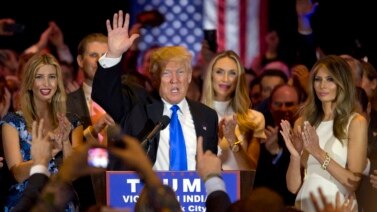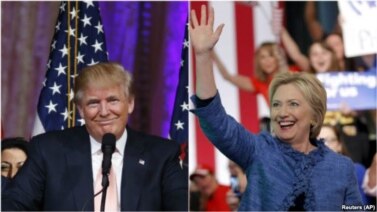
Americans are divided about how involved the United States should be in the problems of other countries.
They also do not agree whether U.S. economic involvement in other nations – such as trade – is good or bad.
These are some of the findings of a report released Thursday by the Pew Research Center. The poll was conducted last month and questioned 2,000 voters.
According to the report, 57 percent of Americans want the U.S. to deal with its own problems. And, they say they want other countries to do the best to solve their own problems.
Among Americans, 41 percent say the United States is doing too much in the world; 28 percent say the United States is doing about the right amount; and 27 percent say the U.S. is doing too little, Pew said.
There is a difference in opinion among supporters of the two major U.S. political parties.
Among Republicans, 62 percent say the U.S. should first deal with its own problems.
Among Democrats, 47 percent have the same opinion, according to Pew.
And 55 percent of Republicans see economic involvement with other nations as a good thing, compared to 44 percent of Democrats.
The poll results are important this week because the race for American president has thinned. Republican Senator Ted Cruz of Texas and Ohio Governor John Kasich dropped out of the race this week. Businessman Donald Trump is the remaining Republican presidential candidate.
Among those Republicans who told Pew they support Trump, 65 percent say U.S. involvement in the global economy is a bad thing. Trump has promised to renegotiate trade deals to benefit the U.S.
The two remaining Democratic presidential candidates are former Secretary of State Hillary Clinton and Senator Bernie Sanders of Vermont.
Among Clinton supporters, 55 percent say they see U.S. involvement in the global economy is a good thing, while 37 percent see it as bad, according to the Pew report.
Among Sanders supporters, 47 percent see it as good, and 48 percent as bad.
Republicans and Democrats are also divided about if the U.S. is more or less powerful than before.
Nearly 70 percent of Republicans say the U.S. has become less powerful, compared to nearly 25 percent of Democrats, Pew reported.
Republicans and Democrats view the threat of global warming very differently. Nearly 80 percent of Democrats see global warming as a big threat. Among Republicans, around 25 percent see it that way.
Republicans and Democrats also disagree about refugees coming from Syria and Iraq. Nearly, 75 percent of Republicans see it a major threat, compared to about 40 percent of Democrats.
On other issues, there is more agreement.
- 80 percent of Americans agree that Islamic State militants are a big threat to the well-being of the United States.
- 70 percent of Americans consider cyberattacks from other nations as a big problem.
- 66 percent of Trump supporters want more spending on U.S. military.
- 43 percent of Clinton supporters and 25 percent of Sanders supporters want more military spending.
I'm Bruce Alpert.
Bruce Alpert reported on this story for VOA Learning English. Kathleen Struck was the editor.
We want to hear from you. Write to us in the Comments Section or share your views on our Facebook Page. Let us know how active you think the U.S. should be in the world.
Words in This Story
poll – n. an activity in which several or many people are asked a question or a series of questions in order to get information about what most people think about something
global warming – n. the recent increase in the world's temperature that is believed to be caused by the increase of certain gases -- such as carbon dioxide -- in the atmosphere
benefit – v. to be helped
cyberattacks – n. an effort to damage computers and steal data


